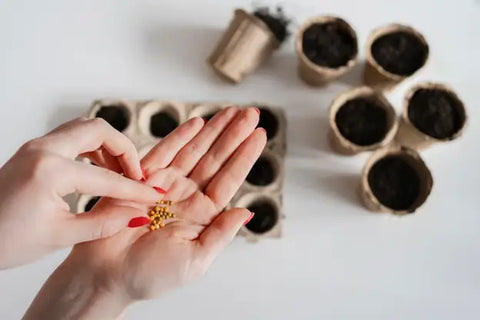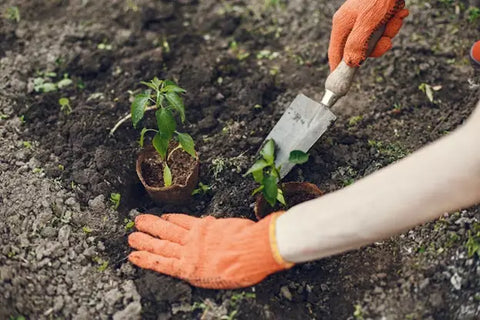Starting Seeds or Buying Plants: Which is Best?
“Starting Seeds vs. Buying Plants: Which Is Better?” is a common dilemma for gardeners. While buying plants may seem like the easier option, starting seeds can be a cost-effective and rewarding process that allows you to have more control over the final result. In this article, we'll explore the pros and cons of starting seeds and buying plants to know exactly about these methods.
1. Pros and cons of planting seeds
Planting seeds can be a rewarding and cost-effective way to grow plants in your home or garden. Here are some pros and cons of planting seeds:
1.2 Pros of planting seeds
Cost-effective
Planting seeds is generally more cost-effective than purchasing seedlings or mature plants. Seeds are relatively inexpensive and can be purchased in bulk. This makes it possible to grow a large number of plants without breaking the bank.
Variety
When planting seeds, you have access to a wide variety of plants to choose from. This allows you to grow plants that may not be available as seedlings or mature plants.
If mentioning general gardening, The Rike may be your ideal choice if you're seeking high-quality seeds for your garden. We offer a selection of seeds, including vegetable seeds, herb seeds, tree seeds, fruit seeds, grain seeds, grass seeds, and flower seeds, all of this will result in a brilliant harvest.
Control over growing conditions
When you plant seeds, you have complete control over the growing conditions. You can choose the type of soil, amount of water, and light exposure that your plants receive. This makes it possible to create the ideal growing conditions for your plants.

Flexibility
Planting seeds allows you to be more flexible in terms of timing. You can start seeds indoors before the planting season begins and then transplant them outside when the weather is right. This can give your plants a head start and help them grow more quickly.
1.2 Cons of planting seeds
Time-consuming
Planting seeds can be a time-consuming process. You need to prepare the soil, plant the seeds, and then wait for them to germinate and grow. This can take weeks or even months, depending on the type of plant.
Risk of failure
There is always a risk that the seeds you plant may not germinate or may die before they mature. This can be frustrating, especially if you have invested a lot of time and effort into planting them.
Requires more attention
When you plant seeds, you need to pay close attention to their growth and provide them with the right conditions for success. This can be more time-consuming than caring for mature plants, which require less attention.
Weather-dependent
Planting seeds is weather-dependent. If the weather is too cold, too hot, or too dry, your seeds may not germinate or may die before they mature. This can be frustrating, especially if you live in an area with unpredictable weather patterns.
Limited growing season
Depending on where you live, the growing season may be limited, which can limit the number of plants you can grow from seeds. This can be especially challenging if you want to grow plants that require a longer growing season.
2. Pros and cons of buying plants
Buying plants can be a convenient and enjoyable way to add greenery to your home or garden. However, there are also some potential drawbacks to consider. Here are some pros and cons of buying plants:
2.1 Pros of buying plants:
Faster Growth
One of the main advantages of planting seedlings is that they grow faster than seeds. This is particularly important if you live in an area with a short growing season or if you want to get a jump start on your garden.
Increased Success Rate
Seedlings are more likely to survive and thrive than seeds because they are already established plants. They have a stronger root system and are better equipped to handle adverse growing conditions such as drought or excessive heat.
Better Quality Plants
When you plant seedlings, you have a better idea of what you're getting. You can see the plant's size, shape, and health before you buy it, which can give you confidence that you're choosing a high-quality plant that will perform well in your garden.

Variety
When you plant seedlings, you have access to a wider variety of plants than if you were to start from seed. This is because nurseries and garden centers usually carry a broader selection of seedlings than seed packets.
2.2 Cons of buying plants
More Expensive
One of the main disadvantages of planting seedlings is that they can be more expensive than seeds. This is because someone has already done the work of growing the plant to a certain size, and you're paying for that labor and expertise.
Limited Availability
While there may be a wider variety of seedlings available than seeds, there is still a limit to what is available at any given nursery or garden center. If you're looking for a specific variety, you may have to shop around to find it.
Transplant Shock
When you transplant a seedling from its container to the ground, it can experience shock. Transplant shock can cause the plant to wilt or even die.
Timing
When you plant seedlings, timing is critical. You need to make sure that you plant them at the right time for your climate and growing season. If you plant too early or too late, the seedlings may not survive.
Disease Risk
When you buy seedlings from a nursery or garden center, there is a risk that they could be carrying diseases or pests that can infect your entire garden. This is why it's important to buy seedlings from a reputable source and inspect them carefully before planting.
3. Starting seeds vs. buying plants: which is better?
Starting seeds is a more affordable option, and it also gives you more control over the growing process. You can choose the specific variety you want to grow, control the soil mix and growing conditions, and avoid the potential pests and diseases that come with store-bought plants. Starting seeds also allows you to get an early start on the growing season and experiment with new plants that may not be available from suppliers.
On the other hand, buying plants from a nursery or garden center can save you time and effort, especially if you're a beginner gardener. You don't have to worry about germinating the seeds or providing the right growing conditions. Nursery plants are typically well-established and ready to be transplanted into your garden or containers. This option is also more practical if you have limited space, as you can select the number of plants you need without having to worry about leftover seedlings.
4. Finally,
In conclusion, to answer exactly the concern “Starting Seeds vs. Buying Plants: Which Is Better?”, we can say that starting seeds and buying plants each has their own advantages and disadvantages, and the choice ultimately depends on the gardener's goals, experience level, and resources.





Leave a comment